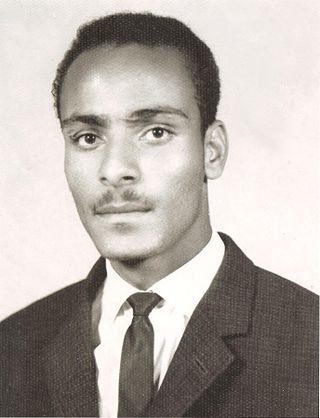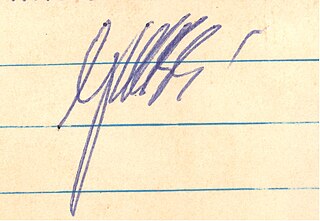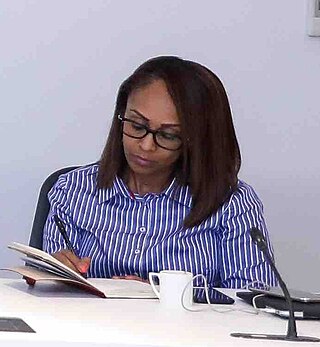Related Research Articles
Amharic is an Ethiopian Semitic language, which is a subgrouping within the Semitic branch of the Afroasiatic languages. It is spoken as a first language by the Amharas, and also serves as a lingua franca for all other populations residing in major cities and towns in Ethiopia.

Tsegaye Gabre-Medhin was an Ethiopian poet and novelist. His novels and poems evoke retrospective narratives, fanciful epics, and nationalistic connotations. Gabre-Medhin is considered to be one of the most important Ethiopian novelists, along with Baalu Girma and Haddis Alemayehu. His books have been successful in commercial sales and in even academic theses. His works are solely based in Amharic and English.

The Coalition for Unity and Democracy, commonly referred to by its English abbreviation CUD, or occasionally CDU, was a coalition of four existing political parties of Ethiopia which combined to compete for seats in the Ethiopian General Elections held on May 15, 2005, and around the end of that year, became a full-fledged political party. Its leader was Hailu Shawul and the political party was dissolved in 2007.

Lalibela, regnal name Gebre Meskel, was a king of the Zagwe dynasty, reigning from 1181 to 1221. He was the son of Jan Seyum and the brother of Kedus Harbe. Perhaps the best-known Zagwe monarch, he is credited as the patron of the namesake monolithic rock-hewn churches of Lalibela. He is venerated as a saint by the Ethiopian Orthodox Tewahedo Church on 19 June.
Hama Tuma is an Ethiopian poet and writer in the Amharic and English languages.
Sahle Sellassie Berhane Mariam is an Ethiopian novelist and translator.

The languages of Ethiopia include the official languages of Ethiopia, its national and regional languages, and a large number of minority languages, as well as foreign languages.

The mass media in Ethiopia consist of radio, television and the Internet, which remain under the control of the Ethiopian government, as well as private newspapers and magazines. Ten radio broadcast stations, eight AM and two shortwave, are licensed to operate in Ethiopia. The major radio broadcasting stations include Radio Fana a private station, Radio Voice of One Free Ethiopia, and the Voice of the Revolution of Tigray. The only terrestrial (broadcast) television networks are government owned and include EBC and other regional stations. In keeping with government policy, radio broadcasts occur in a variety of languages including Amharic, Afaan Oromo, Tigrigna, and more. There are also many video sharing websites which are a popular way of getting information as well as entertainment in Ethiopia.

Abe Gubegna was an Ethiopian writer. His name is sometimes spelled "Abbé" or "Abbie". He published eight novels, five plays, three collections of poetry, and translated several biographies of world leaders as well as other works. Abe mainly wrote in Amharic, but two of his books were written in English.

Wallelign Mekonnen Kassa was an Ethiopian Marxist student activist and militant active in the Ethiopian Student Movement from the mid-1960s until his death in 1972. Wallelign was the author of the highly influential but contentious article On the Question of Nationalities in Ethiopia published in 1969.

Eyob Mekonnen Yalem was an Ethiopian reggae singer widely considered as progenitor of reggae music in Ethiopia. His songs were well known for their themes of "love, understanding, and respect".

Demeke Mekonnen Hassen is an Ethiopian politician who was Deputy Prime Minister of Ethiopia from 2012 to 2024, Minister of Foreign Affairs from 2020 to 2024 and former vice-president of the Prosperity Party. He previously served as chairman of the Amhara Democratic Party (ADP) and deputy chair of the Ethiopian People's Revolutionary Democratic Front (EPRDF) until the dissolution of the two in December 2019.
Andargachew Tsege, also known as Andy Tsige or Andy Tsege, is an Ethiopian politician. He is the chief executive officer of ESAT, a nonprofit independent media outlet in Ethiopia. He previously served as the secretary-general of Ginbot 7, a political party that was labeled as a terrorist group by the Ethiopian government until 2018. On 23 June 2014, he was abducted by Ethiopian security forces while in transit in Yemen's Sana'a International Airport and held at an unknown location in Ethiopia. On 29 May 2018, he was freed by the Ethiopian government following political reform by Prime Minister Abiy Ahmed.

Vahe Tilbian is an Ethiopian singer of Armenian descent. A solo artist, he became lead singer for the Ethiopian group Zemen Band. He released his debut solo album Mixology in 2012. He was part of the pan-Armenian music formation Genealogy who represented Armenia in Eurovision Song Contest 2015 with the song "Face the Shadow" finishing 16th overall.

Kebede Michael was an Ethiopian-born author of both fiction and non-fiction literature. He is widely regarded as one of the most prolific and versatile intellectuals of modern Ethiopia – he was a poet, playwright, essayist, translator, historian, novelist, philosopher, journalist, and government minister belonging to the Shewa Amhara nobility and member of the Solomonic dynasty. His maternal ancestor was King Sahle Selassie of Shewa.

Tesfaye Sahlu also known as Ababa Tesfaye, was an Ethiopian comedian, children's storybook author, and former singer. He provided entertainment for the Ethiopian troops of the Kagnew Battalion serving in the Korean War. He received awards from Emperor Haile Selassie, the Ethiopian Fine Art and Mass Media Prize Trust. He was most widely known for his children's television program on the Ethiopian national broadcaster EBC, where he coined the catchphrase, "Lijoch Yezare Abebawoch Yenege Freywoch".

Gibreab Teferi Dasta, also spelled Gebreab Teferi, was an Ethiopian activist, poet and playwright known for his extensive knowledge of the Ge’ez and Amharic language.

Billene Seyoum Woldeyes is an Ethiopian politician, poet and author who is serving as the Foreign Press Secretary for the Office of Prime Minister of Ethiopia since 5 November 2018. Billene speaks as the prime minister's foreign spokesperson in English.
Daniachew Worku was an Ethiopian writer whose works include novels, plays and short stories. He wrote in both Amharic and English.
References
- ↑ "Nebiy Mekonnen". World Literature Today.
- ↑ Huang, Carol (1 September 2006). "Tomorrow Is Another Day". The American Scholar.
- ↑ Negash, Mesfin (25 September 2014). "Writing from Prison". Sampsonia Way.
- ↑ "Ethiopian Poet Nebiyu Mekonnen Passed Away". Borkena.